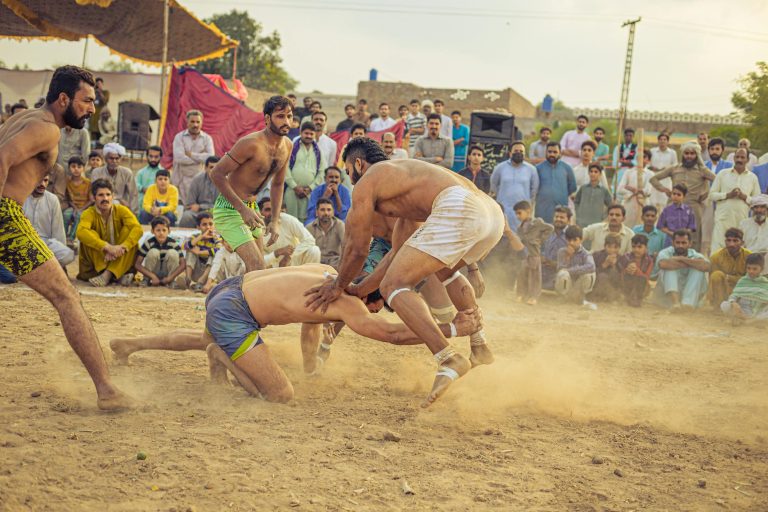Sports are more than just games; they reflect the cultural identity and historical roots of a nation. In Pakistan, traditional sports like Kabaddi and Wrestling have thrived for centuries, holding a special place in the hearts of the people. These sports are not only a source of entertainment but also showcase physical strength, skill, and the vibrant rural culture of the country. Despite the rise of modern sports, Kabaddi and Wrestling continue to symbolize tradition and heritage in Pakistan.
Kabaddi: The Pride of Rural Pakistan
What is Kabaddi?
Kabaddi is a team sport that combines physical endurance, strategy, and agility. Originating in South Asia, it involves two teams where players take turns trying to tag opponents and return to their side of the field without being tackled. The continuous chant of “Kabaddi, Kabaddi” adds to the excitement and rhythm of the game.
Kabaddi’s Cultural Significance
In rural Pakistan, Kabaddi is more than a sport—it’s a celebration of community and tradition. It’s commonly played at local fairs, cultural festivals, and special village tournaments, bringing people together. The sport thrives particularly in Punjab, where it has been passed down through generations.
Modern Developments in Kabaddi
While Kabaddi has strong roots in tradition, it has also evolved as a recognized international sport:
- Pakistan’s national Kabaddi team competes in international events, such as the Kabaddi World Cup.
- The establishment of professional leagues like the Super Kabaddi League (SKL) has brought modern recognition to this traditional sport.
- Players from rural areas are now gaining nationwide fame, inspiring younger generations to embrace the game.
Wrestling: A Test of Strength and Skill
The Legacy of Wrestling in Pakistan
Wrestling, or “Kushti” as it is traditionally known, has been part of Pakistani heritage for centuries. Originating in ancient South Asia, Kushti is a form of grappling that requires tremendous physical strength, balance, and technique. Wrestlers train in traditional clay pits known as akhadas, a practice deeply rooted in rural Punjab.
Famous Pakistani Wrestlers
Pakistan has produced some legendary wrestlers who have made their mark both nationally and internationally. Among them:
- The Great Gama: A symbol of strength, Gama Pehalwan remains one of the greatest wrestlers in history. His legacy continues to inspire modern wrestlers.
- Bholu Brothers: This wrestling family from Pakistan brought international recognition to Kushti during the mid-20th century.
- Inam Butt: A modern wrestling icon, Inam has won gold medals at the Commonwealth Games, putting Pakistan on the global wrestling map.
The Training Regimen of Kushti
The life of a traditional wrestler revolves around disciplined routines:
- Diet: A wrestler’s diet typically includes milk, butter, almonds, and other protein-rich foods to maintain strength and stamina.
- Training: Wrestlers engage in intense physical training, including weightlifting, rope climbing, and grappling.
- Lifestyle: Kushti emphasizes discipline, with wrestlers often living in communal spaces (akhadas) where they focus solely on their training and well-being.
Challenges Facing Traditional Sports
Lack of Infrastructure and Funding
Despite their cultural importance, Kabaddi and Wrestling face challenges such as limited funding and a lack of modern infrastructure. Villages may lack proper facilities, and professional opportunities remain scarce for athletes.
Competition with Modern Sports
Cricket and football dominate Pakistan’s sports landscape, overshadowing traditional sports. Youngsters often gravitate toward popular global sports, leaving Kushti and Kabaddi with fewer participants.
Need for Promotion and Recognition
To preserve and promote Kabaddi and Wrestling, there needs to be greater government support, professional leagues, and international exposure. Schools and sports academies can play a significant role in reviving these traditional games.
The Resurgence of Traditional Sports
The Role of Leagues and Tournaments
Events like the Kabaddi World Cup and local wrestling championships are breathing new life into these traditional sports. Pakistan’s participation on international platforms has sparked renewed interest among the youth.
Media and Social Media Influence
The rise of social media has provided a platform for Kabaddi and Wrestling players to showcase their skills, reach larger audiences, and gain recognition. Platforms like YouTube and TikTok have played a pivotal role in highlighting rural sports events.
Government Initiatives
The Pakistani government and sports federations are increasingly recognizing the importance of preserving these sports through funding, local events, and athlete sponsorships.
Why Kabaddi and Wrestling Matter Today
Traditional sports like Kabaddi and Wrestling are an integral part of Pakistan’s identity. They promote:
- Health and Fitness: Encouraging physical fitness and strength among youth.
- Cultural Heritage: Keeping alive centuries-old traditions and values.
- Community Building: Bringing people together through sportsmanship and celebrations.
In an age of globalization, preserving such sports ensures that Pakistan’s unique cultural identity remains intact.
Conclusion
Kabaddi and Wrestling are more than just games in Pakistan; they are a living testament to the country’s cultural heritage and history. Despite facing challenges, the resilience and spirit of these sports continue to thrive. With proper promotion, infrastructure, and support, Kabaddi and Wrestling can gain the recognition they truly deserve both locally and internationally.
FAQs
1. What is the origin of Kabaddi in Pakistan?
Kabaddi originated in South Asia and has been a popular rural sport in Pakistan, especially in Punjab, for centuries.
2. Who is the most famous Pakistani wrestler?
The Great Gama is the most legendary wrestler in Pakistan’s history, followed by modern icons like Inam Butt.
3. What challenges do traditional sports face in Pakistan?
Traditional sports like Kabaddi and Wrestling face issues such as lack of funding, infrastructure, and competition from modern sports.
4. How can Kabaddi and Wrestling be promoted in Pakistan?
Through government support, professional leagues, international exposure, and the involvement of schools and sports academies.
5. Are there international Kabaddi and Wrestling competitions?
Yes, Pakistan participates in events like the Kabaddi World Cup and international wrestling championships.


